A Japanese yen-related exchange traded fund is reeling, with the currency touching a fresh two-decade low.
The CurrencyShares Japanese Yen Trust (NYSEArca: FXY), which tracks the yen against the U.S. dollar, fell 1.2% on Wednesday. FXY has declined 13.4% year-to-date.
Meanwhile, the yen hit 134 against the U.S. dollar Wednesday, its lowest level since February 2002, and it has depreciated about 16% against the USD so far this year, the Wall Street Journal reported.
The weakening yen has also accelerated inflationary pressures in the developed Asian economy since it uses the yen to buy imported goods denominated in the greenback. Energy, in particular, has been a major concern since the island nation imports almost all of its oil and gas, which are USD-denominated.
Bank of Japan Gov. Haruhiko Kuroda has recently caught some flak after pointing to data that suggested Japanese consumers have exhibited increased tolerance for price rises. He even welcomed the trend as a sign the country was moving away from its decades-long fight against deflation, which that the central bank blamed for stagnating the economy.
Kuroda has since issued an apology for his remarks in response to heightened political pressure with a parliamentary election coming up.
“The expression that households are tolerating price increases was completely inappropriate, and I take it back,” Kuroda said, adding he recognized that paying more at the store was painful for consumers and not something that is welcomed.
Japan’s consumer prices have jumped at the fastest pace in three decades, but Japan’s inflation rate of 2.5% in April was well below the 8.3% in the U.S.
The Bank of Japan has long targeted an inflation level of around 2%, but not in the way that it is occurring now. The central bank would prefer modest price rises that would parallel wage increases, which would help foster a virtuous cycle of corporate investment and economic growth.
Furthermore, Japan’s ultra-low interest rates would also fuel greater stimulus if wages and prices were both rising.
For more news, information, and strategy, visit VettaFi.
